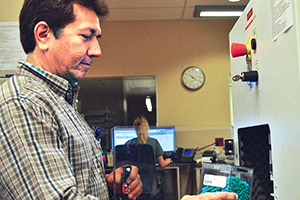By NANCY FRAZIER O'BRIEN
A state-of-the-art robotic pharmacy is helping Saint Joseph Hospital in Denver achieve some old-fashioned goals — to reduce medication errors and give nurses more time at their patients' bedsides.

Scott A. Cardona, pharmacy operations manager at Saint Joseph Hospital in Denver, loads capsules into the PillPick robot, which packages medications for patients according to physicians' orders.
The 365-bed hospital, which opened in December, has what hospital officials describe as the first fully robotic pharmacy in the nation. Saint Joseph is part of SCL Health, formerly the Sisters of Charity of Leavenworth Health System.
"The way health care is going is automation," said Barb Jahn, interim president and chief operating officer of the hospital. But she said the impetus in designing the pharmacy was to "make for a better patient experience in the medication delivery process," keeping nurses at the bedside rather than walking to and from dispensing cabinets.
Safety also was a key factor. According to Don Tillman, pharmacy director, the hospital had previously achieved an accuracy rate of 99.7 percent in terms of the medication sent to nurses. But with 4,000 to 5,000 doses of medicine dispensed each day, "that could mean 12 to 15 errors a day," he said.
The vast majority of these errors were caught by nurses before the medication was dispensed to patients, Tillman said, "but if we can eliminate the first error, it is much safer down the line."
He said the goal was to "increase our accuracy rate to 99.99966 percent, or just three errors in a million."
The new pharmacy is made up not of one robot but of several robotic systems that dispense different types of drugs or perform specific pharmacy-related tasks such as inventory control and automatic purchasing of medications when supplies run low.
"But of course there is always going to be a human component," Tillman said. "The robots need tender loving care. The (pharmacy employees') work morphs from picking and distributing medications to more of the handling of the robot and 'feeding' the robot what it requires."
The pneumatic tube delivery system and several of the robots were developed by Swisslog's Healthcare Solutions division. Swisslog, an international company, has its North American headquarters in Denver.
The process of dispensing medications begins with the physician entering orders into the patient's electronic medical record, which are verified by a pharmacist before being sent to the robots. The software routes the orders according to the types of drugs being dispensed, and each evening the PillPicker robot prepares a PickRing with a 24-hour supply of medications needed by the patient.
After more human verification, the PickRing is then placed in a pneumatic tube system for delivery to the patient's room. With the wave of an ID badge, the nurse can retrieve the medicine without leaving the patient's room and dispense it after scanning the patient's wristband and the bar code on the medication.
That covers about 60 percent of drugs dispensed. Tillman said the other 40 percent includes narcotics, which are "secured under lock and key differently"; drugs that "might be needed urgently" for pain or nausea "and waiting for the robots to create PickRings would delay care"; and intravenous solutions or liquid medications that are handled by an Admixture robot.
Use of the Admixture robot is being phased in gradually, Tillman said, because it needs to be taught how to prepare each drug separately. But once the education has been completed, the preparations will be available "more safely, more accurately and with better sterility," he said.
Jahn said the cost of the new robotic pharmacy was "in the millions" but some components, such as the pneumatic tube system, benefit the entire hospital, which was built at a cost of $623 million.
The new robotic system "is pharmacy-friendly, hospital-friendly and, bottom line, safer," she added. "Safety was a huge part of our decision."
Copyright © 2015 by the Catholic Health Association
of the United States
For reprint permission, contact Betty Crosby or call (314) 253-3477.